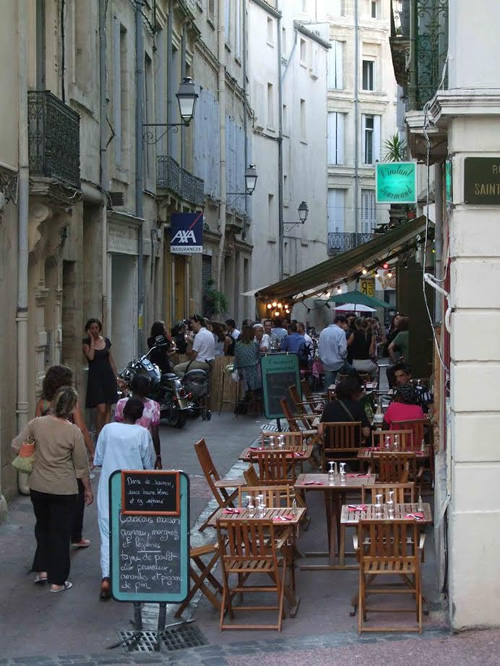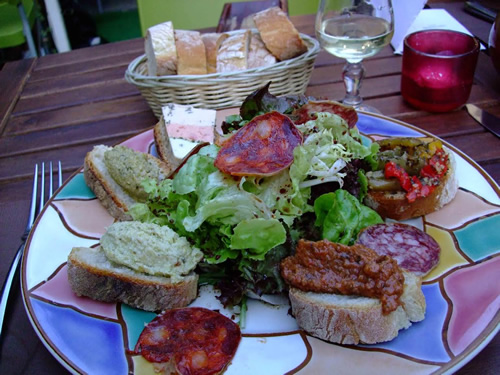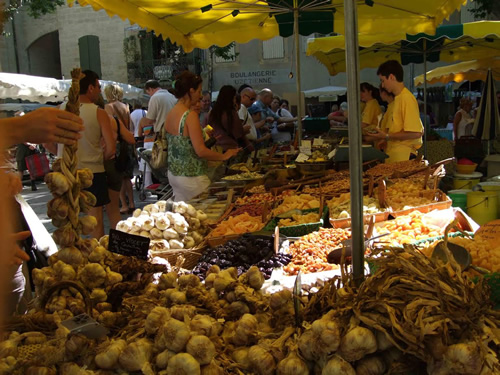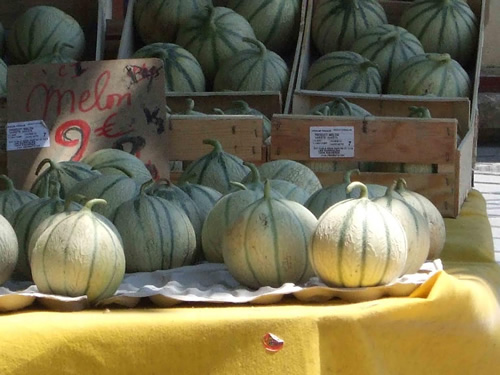Food and Wine in the Languedoc, France
Montpellier is a Great Culinary and Cultural Center
Articles and photos by Beebe Bahrami
 |
| Lunch and dinner time are busy in the walking streets of Montpellier. |
Raise Your Glass to Rabelais and the Local Wines!
In the heart of the Promenade du Peyrou in Montpellier, I pulled a wine glass from around my neck out from a burgundy-colored pouch with Le Festin de Rabelais splashed across it. I proffered my glass to the winemaker from Domaine du Pech St. Pierre. I had asked to try the best of his red wines. He straightened the red bandana tied across his forehead, pulled a bottle from the counter, and started to pour. "Women tend to like this one," he said. "Of the two premium red wines I have here today, this one has a lower tannin content."
As if that explained everything. I took a sip. It was fruity and full-bodied, but it could have been bold. I wanted to try the other red, the daring one the winemaker saved for men. I was annoyed that he had segregated his wines. Nevertheless, I walked away and sampled local foods while finishing the "feminine" glass.
 |
| Dinner time in the medieval quarter of Montpellier. |
I was at Montpellier's food and wine festival in honor of writer, humorist, doctor, and all-around lover of good food and wine, Francois Rabelais (1483-1553). (1483-1553). Festival-goers may purchase a booklet of coupons good for exchange at any of the dozens of white-pitched tents along the Promenade du Peyrou, under which Languedoc's finest regional chefs, winemakers, and artisanal cheese creators and bread and patisserie bakers offered their finest culinary creations. Each Rabelais-rouser received a burgundy-colored picnic pouch filled with a glass wine glass, fork, knife, spoon, and napkin. Louis XIV's horse-riding statue held the park and festival center. Some festive soul had placed a great white chef's hat on the king's head.
I returned to the AOC Corbieres tent and found the man in the red banana. My glass was empty again, and I again extended it to him and smiled. "Please give me the red wine you say men prefer this time." He gave me a head-to-toe consideration, smiled mischievously, and poured the wine generously as I handed over another coupon from my booklet. I took a sip. Finally, more tannin meant more earth; the fruit was balanced with strong mineral tones — the ones I imagined locked in the secrets of Languedoc's red earth, especially in Cathar country from which this particular vintage sprang. It was at once silky and earthy, like green moss and mushrooms. I held my glass in a toast to Monsieur. He nodded in return, a twinkle in his eye.
Montpellier: A Geographical and Cultural Center in Languedoc
Montpellier is central to so many delightful destinations that most people use it only as their transfer point, often on their way to the more known and expensive Provence. But here, there is a similar sunny disposition amongst the locals who welcome visitors and encourage them to partake of the fruits of the land. Some 40% of wine produced in France comes from Languedoc-Roussillon. The territory is a magnificent mix of wild mountains, hills, forests, and salty shorelines.
Montpellier's central position makes it a perfect home base in southern France to explore the many wine and food-producing hinterlands of Languedoc-Roussillon. But before you venture beyond the city's fortress walls, visit the daily markets, one covered, Les Halles, and one in the open air on the edge of the Place de la Comédie near the tourist office. Also, soak up the many wine and food shops dedicated to the indigenous local products of the land and sea. Finally, I will sample these same delights in the restaurants contained within the old stone walls of the old city.
Montpellier has been a university town for several centuries. It also has an engaging 16th-century teaching garden, the Jardin des Plantes, near the famous medical school. Here, medicinal and decorative plants grow from near and far. The edible and medicinal herbs and flowers are clearly marked. Frogs, fish, ducks, and the occasional cat inhabit the greenery.
The Spanish-French Connection
Another fascinating aspect of Montpellier is the solid Spanish-French connection. This cross-Pyrenean link goes back hundreds and thousands of years but was recently reinvigorated by the Spanish, who fled Franco's Civil War and made this part of France their new home. Almost every other person I met in Montpellier had some connection, recent or more distant, to Spain. From the ancient cultural crossroads shared between Catalan and Occitan cultures, the train between Barcelona and Montpellier reinvigorates the connection daily, filled with people coming and going from each country, like a living and active cultural tapestry.
Top Five Day-Trip Recommendations from Montpellier
Beyond Montpellier and into the fruitful hinterland, here are my recommendations:
- Take in the Saturday market day in Uzes to the northeast, with a visit to Nimes and the Pont du Gard for some Roman treasures. Or, give yourself the whole day in Uzès; the small town will readily provide you with plenty to absorb, from significant cobblestone pathways and churches to the wealth of local foods and wines, including truffles when available and in season.
 |
| Market day in Uzes. |
 |
| The small melons of the region are famous and are a great treat. |
- Drive through Cathar country,especially the lands including and south of Bezier, Narbonne, and Carcassonne. Make a special visit to the Magdalene chapel in Renne-le-Chateau, near Couiza, to absorb Mary Magdalene's legacy in the south of France. Lunch in the town square in Limoux after stopping at a couple of surrounding vineyards specializing in La Blanquette de Limoux, a vibrant white wine unique to the region. Limoux's market day is Friday.
- Visit the village and monastery of St-Guilhem-le-Desert through vineyards west and north of Montpellier. The monastery church's cloister now stands in New York City's Cloisters, a sale and transfer that happened in the 19th century. The church still merits a visit and has lovely Romanesque influences. Walking paths around the village can take you into herb-covered hills.
- Visit the Minervois wine region, south and west of Montpellier. Walk. Stroll through the vineyards and stop for tastings at places advertised on the roadside as open to the public.
- Soak up the unique salt marshes with a visit to the Camargue, lunch in Arles, and then return to Montpellier via the coast for a dinner of locally farmed oysters from the Bassin du Thau in Sète (a few kilometers south of Montpellier)..
Some Local Culinary Fundamentals
Wine
Regarding those prolific wines, AOC Languedoc wines make up many denominations. You could easily dedicate weeks to exploring the region for tastings. To help out, here are the main AOC designations within the region: Corbières, Minervois, Coteaux du Languedoc, Fitou, Saint-Chinian, Faugeres, Clairette du Languedoc, Limoux, Cabardes, Malepere, Banyuls, Berlou-Chinian, Clairette de Bellegarde, Collioure, Costières de Nîme, Côtes de la Malepère, and Côtes du Roussillon, among others.
Weekly Markets in Montpellier
There are numerous markets
in Montpellier.
The tourist office is a terrific place with knowledgeable and helpful staff for events, culinary activities, and beyond. You may also rent bikes via the Montpellier tourism website, which is a pleasant alternative to driving into wine country or to the coast for those oysters. There are many fine restaurants
in Montpellier for all travel budgets.
Accommodations
I strongly recommend renting a vacation apartment, which you can easily find via Montpellier's numerous local or international holiday apartment rental sites, such as Airbnb.com.
This way, you will have a kitchen to haul your market catch and enjoy the daily food and wine finds as a local. You can rent an apartment for as low as US$350 a week for a cozy studio or a larger place as luxurious as you wish for US$700 per week. Either way, a vacation home rental is more economical than a hotel.
|
Beebe Bahrami is a freelance writer and cultural anthropologist specializing
in travel, food and wine, and cross-cultural writing. |
